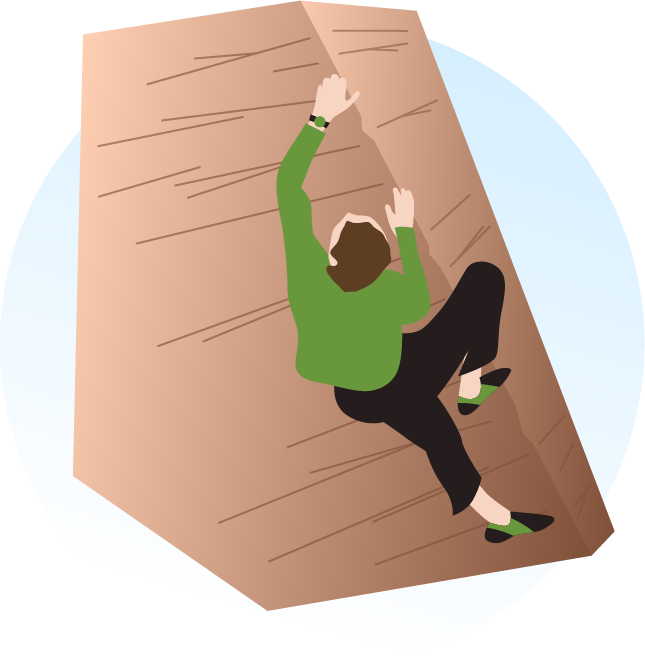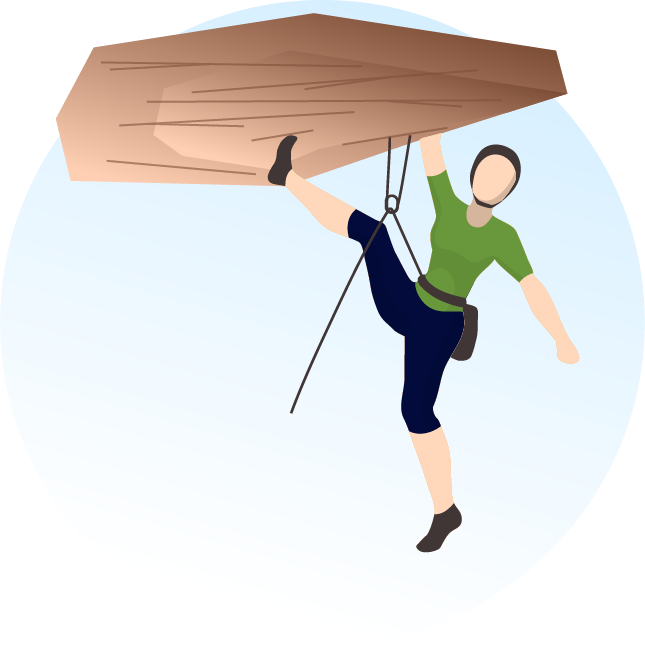Looking for an activity that gives you a complete mental and physical boost? Look no further than rock climbing. This sport pushes you to your limits, gives you a huge sense of accomplishment, and, if you opt to rock climb or boulder outdoors, even allows you to sample some stunning scenery.
What is rock climbing?
Broadly speaking, rock climbing, refers to any sport that you use your hands and body to climb up, or down and even across, either natural rock formations or artificial climbing walls. This involves using gear such as helmets, ropes and harnesses, particularly when scaling tall heights such as cliff edges or mountains.
What is bouldering?
Bouldering is a style of rock climbing, focused on climbing shorter routes, often focused on climbing boulder-style rocks either outdoors or on artificial boulders indoors, and, usually without using ropes or a harness.
What is the difference between rock climbing and bouldering?
Rock climbers usually scale larger walls or rock surfaces and when bouldering, these are usually much smaller. Rock climbers can require more endurance, climbing for longer however boulderers require quick bursts of physical energy to propel them across shorter surfaces without gear.
However, both fall under the same strand of sport and test strength, power, and endurance, which means the physical, mental, and overall benefits of rock climbing and bouldering are very similar.
So, what are the benefits?
Quite simply, rock climbing offers a bit of everything. So, if you’re thinking of trying it out, you’ve made the right choice. Here are 7 amazing benefits of rock climbing and bouldering.
1. Increases strength and grip

Rock climbing incorporates your forearms, legs, back and core, so it’s only natural you’ll become stronger the more you practise it. Your grip will also improve markedly in the process.
Here are some examples of where the body’s different muscles come into play during climbing:
- The latissimus dorsi (the pair of wing-shaped muscles located in the middle of your back, also known as ‘the lats’ for short) pull the body upward.
- The forearm flexors are used to open and close your hands around each hold.
- The abdominal muscles stabilise the body and keep the pelvis aligned with the chest.
- The quadriceps (the group of muscles located in the front of the thigh) push your body upward, enabling you to step from one foothold to another.
Taking all of this into account, it’s little wonder professional rock climbers have such lean physiques.
However, it’s not essential to have the body of Chris Sharma to be a good climber. Good climbing is a mixture of strength, technique and determination.
You might be happy with your level of strength, or you may feel like you want to build it up in order to climb regularly. If so, we recommend these exercises. There are even tailored indoor rock climbing workouts you can try.
2. Burns calories

Rock climbing not only provides an effective strength workout – it’s also a great form of cardio.
How many calories does rock climbing and bouldering burn?
How many calories you burn depends on your age, gender and body type. But research from Charles University in Prague, Czech Republic has found that, even if a 155-pound person is climbing a few notches below “maximal effort,” he or she will burn between eight and 10 calories per minute. That equates to between 480 and 600 calories per hour.
To put these numbers into context, there are around 550 calories in a Big Mac. So, if you climb for around an hour or longer, you could burn off up to an entire Big Mac. That’s a nice thought, isn’t it? This shows how demanding – and rewarding – rock climbing is.
3. Improves balance

Balance is everything when you’re climbing. Without having the right amount of balance, you’re going to struggle to shift your centre of gravity into an optimal position to help you complete a problem. Good balance in climbing can prevent you from falling, reducing your chances of injury.
As we explained above, increased core strength is one of the main benefits of rock climbing. And strength and balance often go hand in hand. Therefore, the more you climb and the more you increase your core strength, the greater improvements you’ll see in your balance. For instance:
- You’ll find it easier to line up your upper and lower body.
- You’ll be able to hold on for longer if your weight shifts over to one side.
Having greater balance will also allow you to experiment with different kinds of challenging positions as you become more experienced. This could look like balancing on very small foot holds and supporting your entire body weight on one foot.
You may even want to try climbing one-legged. Don’t think you can do that? We refer you to the example of Craig DeMartino.
In 2002, Craig fell from 100 feet during a climb and had his leg amputated 18 months later. Since then, he’s become the first amputee to climb Yosemite’s El Capitan in under 24 hours and a two-time Bronze medal winner at the Paraclimbing World Championships.
What greater example is there of how much rock climbing can improve your balance, than someone who can do it with one leg?
4. Helps with problem solving

Any ardent rock climber knows that ‘fight or flight’ feeling. The feeling that your feet and hand positions are all wrong and your next move needs to be perfect or you’re going to fall.
With practice, though, this kind of problem solving and (literally) thinking on your feet becomes second nature. It’s bound to happen when you’re constantly having to rescue yourself from tricky situations.
Through a bit of trial and error, you will become more familiar with your body and what it’s capable of. And in some respects, you might surprise yourself.
Just to be clear, you won’t get it right all the time. You might suffer the odd bruise or sprain when trying to solve a problem.
There is also no ‘right’ or ‘wrong’ way of solving a problem. No two climbers are the same, and everyone has their own thought processes.
Moreover, your physique plays a key part in how you react to certain situations. Check out this video from Howcast explaining how you can solve different climbing problems based on your body type.
5. Provides a sense of community

Ask most climbers and they’ll you tell you one of their favourite aspects of the sport is the social side.
Rock climbing can be quite a tight-knit sport by nature. For example, if you visit a climbing gym, you’re often sharing the same wall space with multiple people at once. And, as this climber has found, this can quickly lead to conversations and friendships being formed. In fact, she met one of her best friends at a climbing gym.
This is just one of many success stories from within the rock climbing community. Check out this heart-warming account from the YouTuber Geek Climber about what the community means to him.
It’s clear from these accounts that climbers are kind, approachable and open-minded. Ultimately, they’re ‘can-do’ people, which transmits well to forming lasting friendships and achieving goals together.
We’ll leave the final word on this to Rich Emerson, chair of the Association of British Climbing Walls (ABC), who has been climbing for more than 40 years. In an interview with The Guardian, Emerson said:
“The climbing community is fantastically open and friendly. That’s one reason it’s growing. You’ll get teenagers climbing next to 20-year-olds climbing next to 40-year-olds climbing next to 60-year-olds, and they all get on, sharing information and looking after each other.”
6. Allows you to explore

Not only does rock climbing give you an endorphin boost, an adrenaline rush and a feeling of invincibility, but it also gives you the perfect opportunity to test yourself in different environments.
In case you didn’t already know, the UK is home to some pretty beautiful rock climbing spots. From the sea cliffs of Pembrokeshire in Wales to Malham Cove in Yorkshire, there are options aplenty for outdoor climbers. You can also visit some beautiful towns and villages along the way, which is a nice bonus.
If you’re more of an indoor climber, there are some fantastic bouldering gyms and climbing walls up and down the country. Some of the competition walls at these venues are works of art! Plus, some of rock climbing’s biggest names have created them. For example, The Foundry in Sheffield contains routes set up by Steve McClure, who’s widely regarded as one of the world’s best rock climbers.
Of course, there are plenty of fascinating rock climbing locations beyond these shores. If you want to take your passion abroad, you’re spoilt for choice.
In Europe, you’ve got the Costa Blanca in Spain, Fontainebleau in France and the Dolomites in Italy.
Over in America, there’s Red River Gorge in rural Kentucky, and Joshua Tree in California, which is home to more than 3,500 routes…
In other parts of the world, there’s Todra Gorge in Morocco, Railay Beach in Thailand, and The Grampians in Australia.
You get the idea. If you’re a rock climber, the world is your oyster.
7. Boosts confidence

Whether you’ve accomplished a goal, formed friendships with other climbers – or better still, achieved something with a fellow climber – rock climbing can boost your confidence in many ways.
We don’t know where you are on your rock climbing journey, but let’s assume you’re a complete novice. The first few climbs you attempt, you’re unlikely to instantly ooze confidence. You may look at some routes and feel like you’ll never be capable of complete them.
The good news is – every experienced climber has felt that way at some point. And they’ve faced and overcome their fears. And then they’ve had off days further down the line. Guess what? It happens – it’s allowed. This constant journey and sense of challenge is what makes rock climbing so exhilarating.
Once you complete a climb of even relatively low difficulty, this will set you on the path to wanting to achieve more and more. You’ll have bad days – but the good times make this sport worthwhile. Better yet, you might enjoy these good times with some genuinely great people.
What rock climbers have to say
It should be clear by now that rock climbing has a positive impact on many facets of your life.
But don’t just take our word for it – let’s see what members of the rock climbing community think…
Alex Metcalfe is the founder of rock climbing equipment retailer Ungraded and is a keen bouldering enthusiast. He said:
“Rock climbing has an array of tangible physical benefits, including building strength and flexibility and the positive endorphins that are associated with exercise. Maybe most importantly, it also has significant psychological benefits.
“I have found that the problem-solving aspect of rock climbing, coupled with the physical aspect, has given me a great sense of accomplishment.
“The social side cannot be understated, either. The climbing community is one of the most embracing out there and building those relationships is one of the best things about climbing.”
Specialist rock climbing insurance from Insure4Sport
If you want to become a regular climber like these guys, you need specialist rock climbing insurance. This protects you if you suffer an injury while climbing and require compensation or if the equipment you use is lost, damaged or stolen.
At Insure4Sport, we offer rock climbing insurance which covers a whole range of scenarios. Find out more by clicking the link above and get an online quote with us today.



